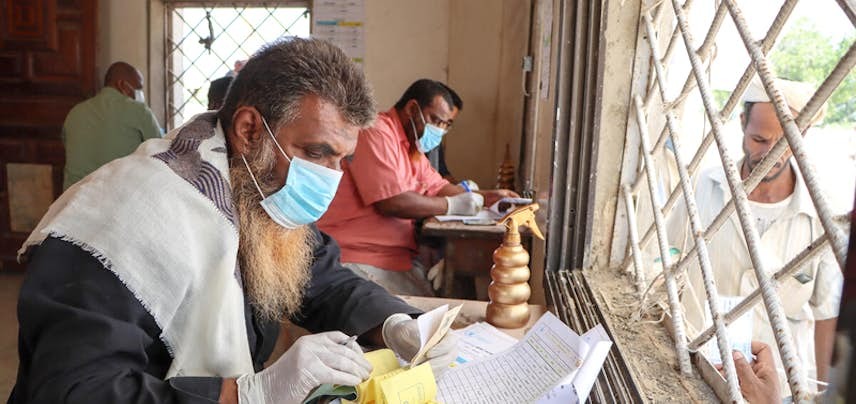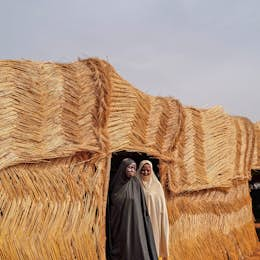Introduction
In 2020, together with its trusted partners, Luxembourg’s humanitarian action stepped up its efforts to maintain support to operations in humanitarian contexts already in existence, while supporting the humanitarian response to the COVID-19 crisis. This approach made it possible to maintain the assistance that is crucial for vulnerable groups during prolonged crises and forgotten crises. Thus, Luxembourg made available significant funding to carry out emergency and rehabilitation projects by Luxembourgish NGOs and to support humanitarian operations by UN agencies and the International Committee of the Red Cross (ICRC).
Luxembourg also continued to honour its commitments within the four-year strategic partnerships agreements concluded in 2017, with the World Food Programme (WFP), the United Nations High Commissioner for Refugees (UNHCR), the United Nations Office for the Coordination of Humanitarian Affairs (OCHA), the United Nations Office for Disaster Risk Reduction (UNDRR) and the International Committee of the Red Cross (ICRC). In view of the COVID-19 pandemic and the complexity of the year 2020, including in terms of humanitarian action, a decision was taken together with the partners involved to extend these partnerships by one year, until the end of 2021.
In addition to the annual financial support, the partnerships with the WFP, UNHCR and OCHA also provide for the possibility of deployment of the emergency.lu platform and the development of solutions in the field of information and communication technologies, thus contributing in an innovative way to the effectiveness of the coordination of emergency efforts on the ground. In addition to the missions in progress, at the request of UNHCR the emergency.lu platform was deployed in a refugee camp in Sudan in December 2020 during the crisis in the Tigray region in Ethiopia that drove thousands of people to flee the country.
In May 2020, Luxembourg submitted its third and final report on the implementation of the commitments made at the World Humanitarian Summit held in May 2016. Luxembourg had subscribed to all the fundamental commitments on the basis of the ‘Agenda for humanity’ and had made 45 national commitments. Luxembourg has thus continued to follow the ‘Grand Bargain’ initiative, an agreement between implementing agencies and donors aimed at making humanitarian aid more effective, partly by making it more predictable. In addition, a report linked to this commitment was also submitted and included by the secretariat of the ‘Grand Bargain’ in the overall report on the initiative.
As in previous years, the Luxembourg government contributed in 2020 to the Emergency Response Fund (CERF), which allows the UN to ensure that humanitarian aid reaches the world’s crisis-affected people as quickly as possible. Contributions to CERF are, specifically, allocated to provide a rapid response to sudden or under-financed crises, such as the explosion in 2020 in the port of Beirut, the forced displacements of people in Burkina Faso or the hurricanes in Central America. Through CERF, Luxembourg’s humanitarian action therefore supports not only urgent crises but also prolonged and ‘forgotten’ crises. Reflecting Luxembourg’s commitment to pursuing its support for the Fund, Franz Fayot, Minister for Development Cooperation and Humanitarian Affairs, participated in the virtual CERF High-level Pledging Event, organised by OCHA and held on 8 December 2020. At the event he announced that Luxembourg would contribute EUR 10 million for the two-year period 2021 – 2022,
As in previous years, in 2020 the Luxembourg Government made contributions to several Country-based Pooled Funds — CBPF. This support enables Luxembourg to honour its commitment to strengthening the localisation of humanitarian assistance and to having reliable funding mechanisms available in order to reach those most in need. In 2020, new support for the Afghanistan Humanitarian Fund was put in place, bringing the number of funds supported by Luxembourg to 10.
In terms of optimising coordination of the humanitarian response to the COVID-19 crisis, Luxembourg actively participated in coordination meetings as part of the COVID-19 Global Humanitarian Response Plan coordinated by OCHA, the ICRC’s preliminary appeal for its response to COVID-19, and the European Union meetings.
Internally, as part of the update to Luxembourg’s humanitarian action strategy, in 2019 and 2020 the Ministry organised thematic workshops on the priorities for humanitarian action by Luxembourg, such as innovation, the nexus between humanitarian action, development and peace (the triple nexus), disaster risk reduction, responsible digitisation and data protection, evaluation and auditing in humanitarian action. These workshops provided a forum for fruitful dialogue between the Luxembourgish and international partners of Luxembourg’s humanitarian action.
In terms of digital transformation and data protection within humanitarian action, in 2020 the Ministry further stepped up its collaboration with the ICRC in this crucial area. In this context, the Ministry contributed, among other things, to the establishment of the DigitHarium, a global forum launched at the end of 2020 to discuss and debate digital transformation within the humanitarian sector, with a focus on data protection, humanitarian protection and ethics in order to find appropriate solutions to the current digital dilemmas. Luxembourg also became a member of the DigitHarium advisory group.
In the context of the COVID-19 pandemic, Luxembourg supported the ICRC’s preliminary appeal as part of its operational response to the health crisis, with a particular focus on Niger and Burkina Faso. In addition, the Ministry supported the activities of Niger’s Ministry of Humanitarian Affairs and Disaster Management in its fight against the COVID-19 pandemic, including in the camps for refugees and internally displaced persons. In addition, Luxembourg’s humanitarian action supported the World Health Organization’s (WHO) emergency fund in the context of the health crisis.
In view of the complexity of humanitarian crises and the fact that the COVID-19 pandemic exacerbated the vulnerabilities of those affected, the Ministry showed flexibility to is partners so that they could adapt their activities to the new challenges.

